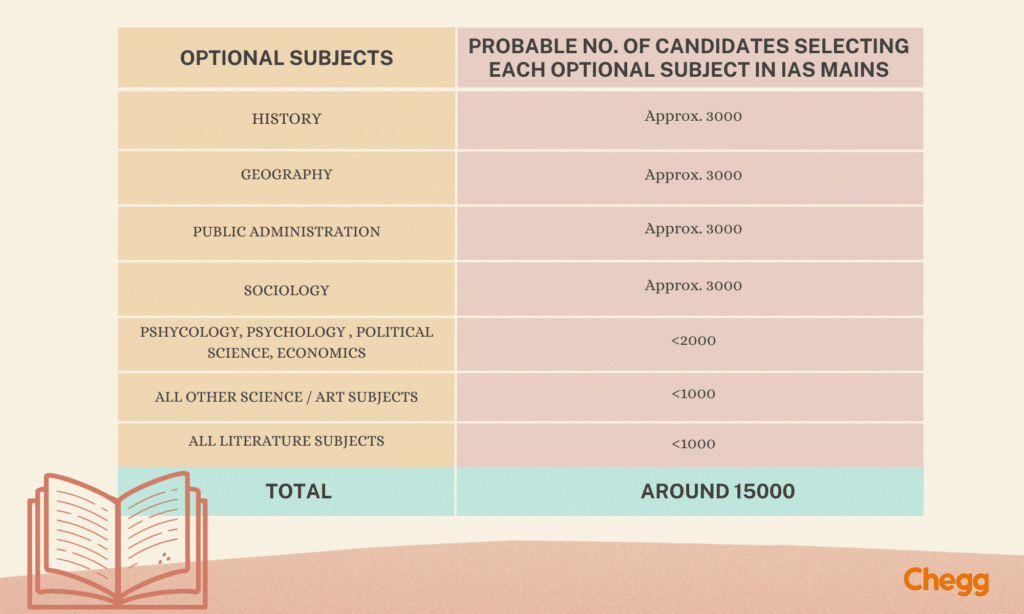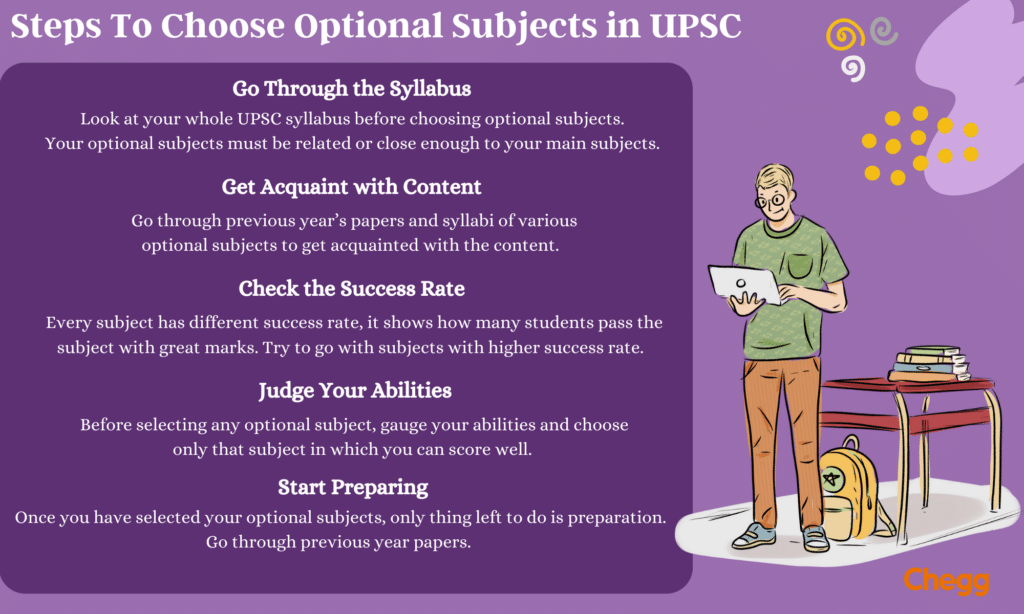

Quick Summary
- UPSC is a constitutional body in India that conducts competitive exams for civil services.
- Shortlist optional subject based on your interest, review past papers and assess availability of resources.
- 5 best optional subjects in UPSC exams include sociology, medical science, literature, law and history.
Table of Contents
UPSC stands for Union Public Service Commission. With more than 10 lakh applicants annually, the UPSC Exam stands out as a top choice among government examinations, attracting fierce competition. To gain an edge in this examination, selecting the best optional subject for upsc is important. This strategic choice increases your chances of clearing the exam and pushes you closer to achieving your aspirations.
Unlike the compulsory General Studies papers, the optional subject offers candidates an opportunity to showcase their expertise in a particular field. This choice not only reflects their academic background and interests but also plays a significant role in determining their overall score.
Now, the question arises: how you are going to select your optional subject. This article will help you decide to choose the best optional subject for upsc for you.
Choosing the Best Optional Subject for UPSC
According to the latest UPSC exam syllabus, there are 48 UPSC optional subjects from which the candidate can choose one. Each optional subject in UPSC comprises two papers (Paper I and Paper II) carrying 250 marks each, making it a total of 500 marks.
Hence, the weightage of the optional paper, i.e. 500 marks out of the total 2025 marks, makes the optional subject about 25% of the final score. Therefore, the choice of UPSC’s main optional subject is extremely crucial. You have to choose an alternative subject in which you believe you can score well.
Best Optional Subject in UPSC
Now coming to the question “Which optional subject is best for UPSC?“, both technical and non-technical subjects can be selected depending on your knowledge of these subjects.
Technical subjects like Mathematics can fetch you high marks as the answers in it are absolute. Basically, unlike humanities subjects, the examiner’s biases or preferences don’t have much impact. However, non-technical subjects, especially those that overlap with the General Studies syllabus, give you more preparation time and reading material overall, thereby helping you prepare well for the IAS Mains exam.
Certain factors can help you decide on the best optional subject in UPSC. Before deciding on an optional subject, a candidate must ask themselves the following questions:
- How much is the syllabus of the optional subject in UPSC?
- How much time for preparation do you have?
- Do you have any prior knowledge of the subject at the graduate/PG level?
- How much syllabus overlap is there between your optional subject and General Studies subject in Prelims or UPSC Mains?
- Are the study material and coaching facilities readily available?
- Do you have the required drive/interest to study the subject for the UPSC exam?
Once you get the answers to the above questions, you can make the right choice in selecting the best optional subjects.
Also Read: Amazing Tips for IAS Preparation at Home

Source: BYJU’S
List of Optional Subject in UPSC
A list of the different optional subject in UPSC is provided below to help you easily decide:
|
Agriculture |
Animal Husbandry & Vet Science |
Anthropology |
Manipuri |
|
Botany |
Chemistry |
Civil Engineering |
Marathi |
|
Commerce |
Economics |
Electrical Engineering |
Nepali |
|
Geography |
Geology |
History |
Oriya |
|
Philosophy |
Political Science |
Psychology |
Punjabi |
|
Public Administration |
Physics |
Sociology |
Sanskrit |
|
Law |
Mathematics |
Management |
Santhali |
|
Medical Science |
Statistics |
Mechanical |
Sindhi |
|
Zoology |
Assamese |
Bengali |
Tamil |
|
Hindi |
Konkani |
Telugu |
|
|
Dogri |
Kannada |
Maithili |
Urdu |
|
Gujarati |
Kashmiri |
Malayalam |
English |
Overlapping Optional Subject in UPSC with General Studies
Here is the UPSC optional subjects list, which is the popular choice among IAS aspirants from both technical and non-technical fields. Because of the high overlap with General Studies papers or other sections of the UPSC exam, these subjects can appear to be the right choice.
- Public Administration: Paper II (Indian Administration) overlaps highly with the polity and governance part of GS II.
- Sociology: Information from Sociology can be used in GS I, essays, and even in ethics papers.
- History: Relevant for both prelims and GS I.
- Geography: Important for prelims as well as GS I.
- Political Science: Relevant to both prelims and GS II.
- Law: Beneficial for prelims as well as GS II.
Subjects like Economics, Philosophy, and Agriculture are also good choices for optional subjects in UPSC.
Ways To Shortlist Optional Subject in UPSC
- Based on the above-mentioned criteria, prepare a list of 4 to 5 subjects that you are interested in.
- Go through the syllabus of each optional subject in UPSC. Read all topics carefully. Underline or highlight the points that you think you know something about or have some interest in the syllabus of each shortlisted optional subject.
- Check out the previous year’s question papers (3-4 years) on the shortlisted optional subjects. Read all the questions. Then again, measure the level of interest you have or the knowledge you have to answer each question.
- The availability of materials and guidance through training matters a lot. For a few papers, it is hard to get standard books, and for some subjects, tuition may not be available. Non-technical subjects can be prepared by self-study.
- By now, you will have a reasonable picture of choosing between 2-3 optional subjects in UPSC. For instance, if you are from an engineering background and are especially good at your engineering subjects, you can choose engineering. If you have an interest in literature or your native language, it will be optimal to select between these two subjects.
- In this scenario, the ‘success rate’ counts. Generally, literature subjects have performed well in all years. You may wind up choosing literature of your native language as your alternative paper. It’s a decent choice.

Other Factors to Consider
For a few people who have worked in a big company, Public Administration is a great choice and in fact, it has been the most chosen option by working aspirants or the people who have worked in the past. Medical students may settle on Medical Science, Zoology or Anthropology as these papers are related to their field.

Best Optional Subject in UPSC for Medical Students
Out of the available options, Medical Science is a natural choice. There have been several IAS toppers with a medical background who took medical science as their optional subject in UPSC.
To some extent, subjects like Zoology, Animal Husbandry and Veterinary Science can also be considered. However, if a candidate from a medical background isn’t willing to opt for medical science as the choice for the optional subject, then non-technical subjects that have some overlap with GS become their choice.
Best Optional Subject in UPSC for Engineering Students
A lot of candidates from engineering backgrounds perform well in the IAS exams. However, if a candidate wants to choose an optional subject based on their previous knowledge, then there are comparatively fewer options, namely Civil, Mechanical and Electrical engineering.
No one would prefer to opt for a technical subject unless one studied the same at the graduate level. Subjects like Maths, Physics and Chemistry can also be considered. The UPSC optional subject reduces the subjectivity in marking to some extent, but the preparation time and effort are huge. So, it’s always better to go through the IAS syllabus and past question papers first.
Also Read: Difference between IAS and IES | Guide to UPSC
Top 10 Optional Subjects in UPSC
After considering the latest UPSC syllabus and recent IAS results, the top 10 optional subject in UPSC can be listed as follows:
1. Sociology
2. Agriculture
3. Medical Science
4. Literature
5. Anthropology
6. Public Administration
7. Psychology
8. Law
9. Geography
10. History
UPSC Exams: Format and Preparation
We know that the UPSC exam is conducted in three phases. While each phase has its own different approaches, the toughest one to crack for many is the UPSC Prelims.
The Prelims consist of two examinations – General Studies I and II, which are also known as CSAT or the Civil Services Aptitude Test. These exams test the general knowledge of candidates in the different fields of Math, Science, and English.
Due to its complicated questions, UPSC Prelims are considered to be one of the toughest entrance exams in the country. Therefore, students work hard to get through UPSC Prelims. However, if you heed the following steps, you can have a better chance of cracking the IAS exam.
Steps on How to Prepare For UPSC
Step 1: Understand the Exam
A student cannot excel in an exam if they do not know what the exam contains. While it is important to know the type of examination, it is equally important to understand the topics that can be covered within the examination.
The UPSC releases a document on their website consisting of all this information, including the syllabus for the exam, the type and format of the paper, and even the schedule. Students must also understand the eligibility criteria well before starting their preparations.
All of this is categorized as pre-preparation for the examinations. This must be done as the first step so that the student is not left confused, or a few days before the exams, about these small details. Thus, starting with these important details lets you move through the preparation journey in a more systematic and organized manner.
Step 2: Start Reading
After completing step 1, you must be aware of the syllabus and the format of the papers. With this knowledge, you can begin your actual studies for the exams. The easiest method of studying is to pick up your old schoolbooks. All the basic syllabus for the UPSC exams can be studied from the NCERT books.
If you are unable to find your old schoolbooks, then you can download them for free. While reading, you may remember most of the concepts, however, you must go over them twice to better prepare yourself.
Additionally, you need to start reading the latest news. The majority of questions in the General CSAT exams come from current events.
Step 3: Take YouTube Lessons
Watching YouTube videos on topics of History and Science can also help students better prepare for the exams. Many YouTube channels offer UPSC coaching and can be used for their preparation.
Step 4: Read and Write
One of the habits we leave after we complete our schooling is learning by writing. While many do it in school, after it ends, people focus more on glazing through the contents of a book to memorize it. While this may work in schools, for the UPSC examinations, you must practice by writing.
Writing helps you learn a particular topic twice: once when you read it out loud and once when you write it. But, more importantly, it psychologically embeds the topic in your mind. Thus, when you are done through your first round of glancing over the books, you must find your old notebooks and begin penning down your subject matter.
Step 5: Take mock exams
After you have prepared yourself well for the exam, you must take many practice exams. Many websites will provide you with past exam question papers for you to attempt. This step is crucial in your preparation as it helps you understand what a real exam would be like.
You must take it with honesty and stick to the time limits. This will not only help you manage your time better, but it will also help you understand your mistakes and calm your nerves for the final paper. You can learn more about it on UPSC Exams.
Choosing the best optional subject for UPSC is entirely your decision. Only an aspirant knows their strengths, weaknesses, tastes, and availability of study materials. Therefore, you can follow the process recommended by us and choose what suits you best.
Ace Your UPSC Exams
Serving your nation in any way is a dream of every Indian, by becoming a civil officer after clearing your UPSC exams, you get a chance to do so. But to be able to pass your exams with flying colors, you need to know all about exam patterns, optional subject in UPSC, scoring, syllabus etc.
For those considering self-study, selecting the best UPSC optional subject is even more important. Choosing subjects that are easier for self-study, such as those with concise syllabus and abundant study materials, can help you prepare efficiently.
And now that you know what the best optional subjects are in UPSC and how to choose the ones that are the right fit for you, you can make your decision easily. So, without any further delay, start preparing to ace your IAS exam.
Evaluate numerous career choices to choose the right career path for yourself. Dive into our guide on Career Advice.
Frequently Asked Questions
Which optional subject is best for UPSC?
The best optional subject in UPSC is the one that suits your interests and aptitude. You should opt for an optional subject that will help you achieve success. Some of the best subjects are History, Geography, Economics, Political Science and Sociology.
Which is the easiest optional subject in UPSC?
Some of the easiest UPSC optional subjects are:
1. History
2. Geography
3. Public Administration
4. Political Science
5. Sociology
How many optional subjects are there in UPSC?
There are 48 optional subjects in UPSC out of which one subject can be chosen for both Paper I and Paper II. Both the papers are 250 marks each. The optional subject syllabus is of graduation level. Candidates can choose an elective subject depending on their graduation degree or the subject in which they are interested.
What are the 26 optional subjects in UPSC?
The 26 optional subjects in UPSC are:
1. Anthropology
2. Agriculture
3. Animal Husbandry and Veterinary Science
4. Botany
5. Chemistry
6. Civil Engineering
7. Commerce
8. Economics
9. Electrical Engineering
10. Geography
11. Geology
12. Indian History
13. Law
14. Mathematics
15. Management
16. Mechanical Engineering
17. Medical Science
18. Philosophy
19. Physics
20. Political Science and International Relations
21. Psychology
22. Public Administration
23. Sociology
24. Statistics
25. Zoology
26. Literature
Which optional is high scoring?
Philosophy is one of the highest-scoring subjects in UPSC as its syllabus is less as compared to other subjects. Apart from this, Sociology and Public Administration are also scoring subjects. But scoring the highest in UPSC also depends on the candidate’s interest in the subject and how familiar they are with it.
To read more related articles, click here.
Got a question on this topic?